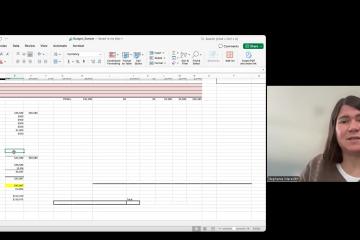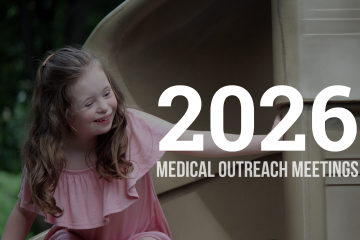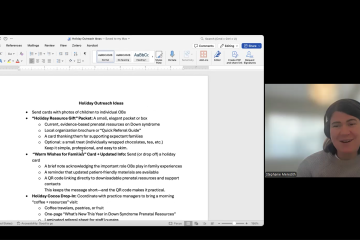Watch this video to learn how disability advocacy organizations can customize their medical outreach program for the unique demographics they serve: rural and small areas, medium-sized areas and suburbs, big cities, and state-based organizations.
Rural and small areas:
- Connect with closest genetic counseling program and SMFM to provide your information and resources. Become best friends with the SMFM or genetic counselor/geneticist that serves your area.
- Connect with social worker at nearest birthing hospitals to provide your information and resources.
- May be able to cover all obstetric medical offices in your area given the number.
- Identify the closest hospitals with Level 3 and 4 NICUs: https://www.texaschildrens.org/blog/2014/05/what-do-nicu-levels-mean
- Providers and hospitals may be in a different state.
- Consider building relationships with online providers: Genetic Support Foundation. (I serve on the board.)
- Rural grants.
- Reflect diversity in resources and use appropriate translations.
- State resources: connection to newborn screening advisory; congenital cardiac screening (DS)
- Nurse managers on the weekend (Be aware nuances hospitals)
- Provide directed training
Medium-sized areas and suburbs of big cities:
- Identify universities with obstetric and genetic counseling training programs. Build relationships with program directors. More likely to have a UCEDD/LEND program. Utilize students.
- You may need to coordinate with big city group and other suburbs to differentiate organizations/programs with medical providers. Consider creating a collaborative brochure with a map.
- May have Down syndrome clinics. Connect for referrals from program coordinator. Partnership.
- More likely to have Grand Round opportunities.
- Goal: Identify and cover all MFMs and GCs—added pediatric clinics
- Military bases?
- Reflect diversity in resources and use appropriate translations.
- Need systems for tracking data and updates to medical contact information.
- Connect with parents who have connections.
Big Cities:
- Identify universities with obstetric and genetic counseling training programs. Build relationships with program directors. May be multiple. Utilize students. More likely to find researcher allies.
- Set realistic goals and don’t get overwhelmed. Most likely to stagnate.
- Data tracking is critical for everyone, but big cities really need a capture rate.
- More likely to have Down syndrome clinics.
- Most likely to have a UCEDD/LEND program.
- Likely to benefit from a volunteer/staff base assigned to different hospitals.
- More likely to have Grand Round opportunities.
- VITAL: Reflect diversity in resources and use appropriate translations.
- VITAL: Need systems for tracking data and updates to medical contact information.
- Partner with other disability orgs.
State-based organizations:
- Consider having satellite representatives to serve all regions.
- Connect with corresponding state and regional medical organizations: https://nccrcg.org
- State-based grants or appropriations
- Public health partnerships
- Connect to UCEDD.
- VITAL: Reflect diversity in resources and use appropriate translations.
- VITAL: Need systems for tracking data and updates to medical contact information.
- Partner with other disability orgs.
- State Developmental Disabilities Council: grants and budgets under $10,000
- Dissemination grants to individuals with Ds and families and providers
- Large Amish population or other hard to reach populations:
- Interagency coordinating council
- Visit them and ask members from those populations: https://ectacenter.org/topics/intercoord/intercoord.asp


